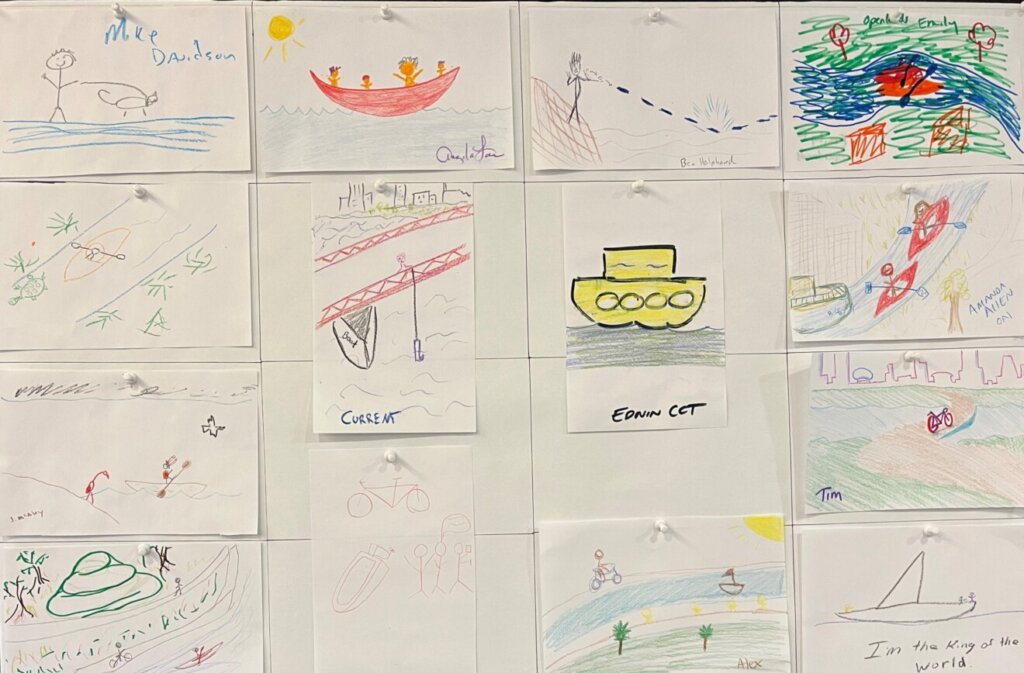Celebrating Seven Years of Our Great Rivers Community Projects

As the year comes to a close, Metropolitan Planning Council celebrates seven years of accomplishments from Our Great Rivers community initiatives, funded by the Chicago Community Trust’s Our Great Rivers fund. Since the fund was established in 2017, Metropolitan Planning Council has supported 45 grantees across five cohorts composed of diverse stakeholders working along the Chicago, Calumet, and Des Plaines rivers. These projects have fostered new partnerships, secured and leveraged additional funding, activated riverfront sites, and made a lasting impact on Chicago’s riverfronts through planning and physical improvements. Here’s a sampling of these impressive projects and their successes.
Partnerships
Community-based Our Great Rivers projects have included more than 150 organizational partners. A project that particularly relied on collaboration, H2NOW Chicago, partnered with more than 20 public and private organizations in their initiative to measure microbial pollutants in real-time. In another project, a coalition of community and civic partners called Calumet Connect created the Calumet Connect Data Book to provide research connecting public health outcomes to land use decisions and develop policy recommendations to address environmental and health disparities in the Calumet Industrial Corridor.
Funding
Since 2017, the Trust’s initial investment of $5.1 million has been leveraged into $13.1 million by grantees. The Confluence project, led by the North River Commission, obtained additional funding from the City to position the Chicago River as a gateway for recreation and economic development in Albany Park. The Little Calumet River Connections Initiative secured a funding commitment from the City to leverage Climate Recovery bond funding for The African American Heritage Water Trail along the Little Calumet River.
Activation
Site activation has been a key focus of Our Great Rivers community initiatives, with grantees hosting more than 200 events drawing more than 25,000 attendees and using visual art to transform public spaces. The Major Taylor Trail is an illustrative example. This project used Our Great Rivers funding to establish a 400-foot-long mural along a portion of the seven-and-a-half-mile bicycle and pedestrian path linking the Dan Ryan Woods with Whistler Woods. Stewardship of the trail continues today through community bike rides and events. The El Paseo Community Garden utilized community organizing and public events to advocate for the Loomis Street “Rainbow Bridge” Mural in Pilsen, completed by the Yollocalli Arts Reach Public Art internship program.
Impact
More than 40 percent of the Our Great Rivers projects led to physical improvements along Chicago’s rivers. Great Rivers Chinatown created a more inviting riverfront in Chinatown’s Ping Tom Park by installing public art, signage, and wayfinding, and two large murals under the park’s viaduct entitled “All As One” and “Between the Mountains and the Water.” Native American Artist X worked with community members and youth from the American Indian Center to design two earthwork installations along the Chicago River at Horner Park and Des Plaines River at Schiller Woods—the first noted installations of wayfinding mounds by an indigenous artist in North America since the creation of the United States.
This year’s projects continued to make an impact on Chicago’s rivers. Highlights include:
- The Delta Institute implemented key recommendations from the Illinois International Port District Master Plan by conducting a feasibility study for establishing green infrastructure, formed a Community Advisory Team to identify potential green infrastructure project sites, and supported brownfield remediation by planting trees to absorb harmful contaminants.
- The McKinley Park Development Council created a framework plan for a connected bike and pedestrian riverfront path along the South Branch of the Chicago River from Ping Tom Memorial Park to the Daley Boat Launch. Graduate students from the University of Illinois’ College of Urban Planning and Public Affairs supported the project by engaging more than 550 people in community outreach efforts and developing design concepts for the riverfront path.
- Southeast Environmental Task Force leveraged the Calumet Connect coalition of civic and community partners to protect communities in the Calumet region affected by environmental harm. Other Our Great Rivers grantees, The Alliance for the Great Lakes, The Great Cities Institute at the University of Illinois Chicago, and Calumet Collaborative are some of the partners in the Calumet Connect coalition. Calumet Connect worked directly with the City and the U.S. EPA to ensure community input is considered in the ongoing remediation process for an old, toxic industrial dumpsite. They are also working with Metropolitan Planning Council and Friends of the Chicago River to ensure residents are informed and deeply engaged in the three-year process to update the Calumet Design Guidelines and Land Use Plan, led by the Department of Planning and Development (DPD). Over the past year, Calumet Connect engaged 80 people through five community events.
- Calumet Collaborative has also been working closely with Riverdale organizations to catalyze the opportunities and mitigate the challenges presented by the Redline Extension. They supported efforts to collect oral histories from residents that will inform an economic and community development framework for the area. Additionally, the Collaborative is supporting land acquisition efforts for community open space along the riverbank and for the new Riverdale Community Land Trust.
- OAI installed and maintained green stormwater infrastructure (GSI) to reduce flooding in Calumet and Northwest Indiana communities while training workers in the field. In 2023, OAI performed maintenance at 16 sites with eight partners and hosted an annual GSI training event, engaging more than 60 participants.
- North River Commission’s Confluence Project redesigned several sites in Albany Park, including RiverLab, an adjacent boat launch located River Park, the Global Garden Refugee Training Farm, and the Lawrence Avenue entrance to Ronan Park. With $6.8 million in TIF funding, the project is now in its implementation phase in partnership with city agencies, private partners, and community members. They have engaged more than 300 people through community meetings and surveys this year.
- Current Innovation’s H2NOW project continues to provide real-time, publicly accessible water quality data on the Chicago River. Now in its third year, H2NOW expanded to the Calumet River and established a water-STEM curriculum called River Lab in partnership with Chicago Public Schools. This initiative earned the Chicago Innovation Award in 2022.
- University of Illinois Chicago’s Great Cities Institute activated the 100th Street site, an open lot that was previously home to utility production and distribution operations along the Calumet River, for public use. In two public events this year, they engaged 250 community members whose input will shape the site’s future development, which may include naturalized river edges, pedestrian trails, gardens, and public art installations.
Our Great Rivers community projects have made strides in transforming the Chicago, Calumet, and Des Plaines Rivers by focusing on environmental challenges and strengthening the connection between residents and the rivers in their communities. MPC is excited to see how these efforts will continue to pave the way for more inviting, living and productive rivers in the Chicago region for years to come.
